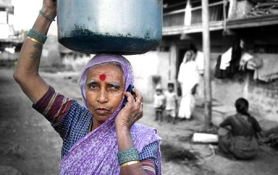New Delhi, May 18: Indian mobile-phone sales have dropped for the first time in 20 years, raising the question: Is a slowdown at hand for the world's fastest-growing smartphone market? Mobile sales dropped 14.5 percent the first quarter (Q1, January-March) 2015, on a quarter-to-quarter basis, compared to Q4 (October-December) 2014 -- from 62 million handsets in Q4 2014 to 53 million handsets in Q1 2015, according to a report of CyberMedia Research, a consultancy.
 The decline in smartphone sales from quarter-to-quarter was 7.14 percent. Cheaper "feature" phones performed worse, with an 18.3 percent sales decline over the same period. India became the fastest-growing market for smartphones in Asia-Pacific in 2014, and is supposed to overtake US as the second-largest smartphone market globally, with 204 million smartphone users by 2016, according to a study by eMarketer, a research firm.
The decline in smartphone sales from quarter-to-quarter was 7.14 percent. Cheaper "feature" phones performed worse, with an 18.3 percent sales decline over the same period. India became the fastest-growing market for smartphones in Asia-Pacific in 2014, and is supposed to overtake US as the second-largest smartphone market globally, with 204 million smartphone users by 2016, according to a study by eMarketer, a research firm.
Is this a Cyclical issues or a larger problem? Do these data indicate that India's mobile-phone growth is topping out? Experts believe cyclical glitches account for the downturn in mobile-phone sales: Unexciting phones, tax issues, increased competition and even extended Chinese new-year festivities. "With major announcements of new handsets and entry of some new brands happening in a big way in Q4 2014, there wasn't really something very exciting in the market for customers that could push up sales in Q1 2015," said Faisal Kawoosa, lead analyst, Telecom Research at CyberMedia.
"At the same time, a change in duty structure and the longer continuation of Chinese new year festivities which generally conclude by mid-February each year, affected the supply chain and inventories."
In an attempt to push local manufacturing, the government, in a budget announcement, increased the excise duty on mobile handsets to 12.5 percent from 6 percent, pushing the cost of handsets by around 4 percent.
Experts said there were two more reasons: First, sales have fluctuated for vendors, with one vendor dominant in one quarter and another in the next. Second, as Kawoosa put it, "a maniacal focus" on online flash sales. "Though there is an Internet revolution in India and brands do need to focus on building their online base, it only works well for new brands (for example, Xiaomi) willing to enter the Indian market," said Kawoosa.
"Established brands, such as Micromax and Samsung, should focus on their existing legacy. The differentiating strength of these brands lies in their distribution network, built and invested in over the years across India, which they should leverage to increase sales."
Overall, the industry will get used to changes (such as the increase in excise duty) and pick up again, he said.
The year 2014 saw the entry of many new players in the mobile market, especially Chinese firms. With an 18.5 percent market share, Samsung continues to occupy the top spot, followed by India's Micromax with 12.1 percent and Microsoft with 9.6 percent.
Within the smartphone segment, Samsung has an even bigger lead, a market share of 27.9 percent, followed by Micromax with 16.2 percent and Intex, an Indian brand, with 9.2 percent.





Comments
Add new comment